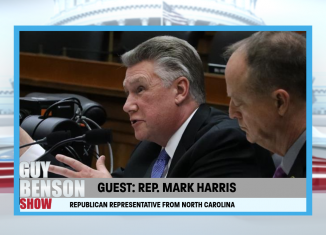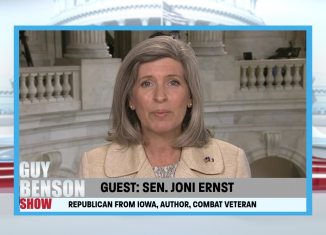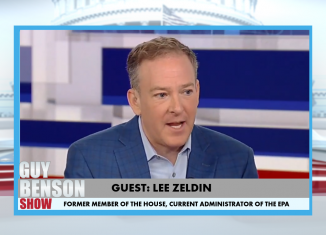Secretary Mike Pompeo Defends Trump Administration’s Foreign Policy From Kamala Harris Attacks
Secretary Of State Mike Pompeo spoke with Fox News Radio’s Guy Benson about the Trump Administration’s foreign policy record. Democratic vice-presidential nominee Kamala Harris criticized the Trump Administration’s foreign policy specifically on the U.S pulling out of the Iran nuclear deal. Secretary Pompeo defended the Administration’s approach saying,
“I don’t think she understood what a terrible deal it was that the previous administration entered into. To be honest with you, she seems a bit confused. Let me walk you through what we’ve done and why we’re in a significantly better place today with respect to the threat that emanates from the Islamic Republic of Iran. First, they have a lot less money. The Iranians have said it’s in the tens of billions of dollars plus. We think it’s even more than that. We’ve denied them an enormous amount of wealth. That means that the leaders can’t steal as much money for themselves, but most importantly, they can’t use that money to threaten the United States of America and our soldiers. Even Secretary Kerry said that some of the money the Iran Nuclear Deal granted to the Iranians could well have presented risk, could’ve been fomenting terror and could’ve resulted in the death of Americans. That’s just unacceptable for President Trump. We were never going to appease the Iranians in a way that harmed America. Second, we built out a real coalition; you see it in the Abraham Accords. The flip, the pivot that we made, that said that the Islamic Republic of Iran’s leadership is in fact the singular most destabilizing force in the Middle East. That was President’s Trump analysis — has led us to where we are today, a safer more stable Middle East where the Emirates and the Bahrainis have now recognized Israel. There are more countries which will follow. We’ve begun to build out a structure, a coalition, a set of partners that will deliver security to that region in a way that — frankly, we inherited a really dangerous place.”
Listen To The Full Interview Below:
Full Transcript:
GUY BENSON, FOX RADIO HOST: Very pleased to be welcomed now back on the program by the 70th secretary of state of the United States of America, Mike Pompeo. Mr. Secretary, it’s great to talk to you again.
MIKE POMPEO, U.S. SECRETARY OF STATE: Guy, it’s great to be with you again today too. Thanks for having me on the show.
BENSON: So, earlier in the week, I was watching the vice-presidential debate, and I don’t want to drag you into the politics of it, but there was a pretty pointed critique of the Trump administration’s foreign policy, particularly on Iran, from the vice-presidential nominee of the Democratic Party, Senator Kamala Harris. In cut 27, here’s part of what she said.
(BEGIN AUDIO CLIP)
SEN. KAMALA HARRIS (D-CA), DEMOCRATIC VICE PRESIDENTIAL NOMINEE: He’s walked away from agreements. You can tell — look at the Iran Nuclear Deal, which now has put us in a position where we are less safe because they are building up what might end up being a significant nuclear arsenal. We were in that deal, guys, we were in the Iran Nuclear Deal with friends, with allies around the country. And because of Donald Trump’s unilateral approach to foreign policy coupled with his isolationism, he pulled us out and has made America less safe.
(END AUDIO CLIP)
BENSON: So Mr. Secretary, a lot to unpack there. Your response to the substance of what she alleged?
POMPEO: I don’t think she understood what a terrible deal it was that the previous administration entered into. To be honest with you, she seems a bit confused. Let me walk you through what we’ve done and why we’re in a significantly better place today with respect to the threat that emanates from the Islamic Republic of Iran. First, they have a lot less money. The Iranians have said it’s in the tens of billions of dollars plus. We think it’s even more than that. We’ve denied them an enormous amount of wealth. That means that the leaders can’t steal as much money for themselves, but most importantly, they can’t use that money to threaten the United States of America and our soldiers. Even Secretary Kerry said that some of the money the Iran Nuclear Deal granted to the Iranians could well have presented risk, could’ve been fomenting terror and could’ve resulted in the death of Americans. That’s just unacceptable for President Trump. We were never going to appease the Iranians in a way that harmed America. Second, we built out a real coalition; you see it in the Abraham Accords. The flip, the pivot that we made, that said that the Islamic Republic of Iran’s leadership is in fact the singular most destabilizing force in the Middle East. That was President’s Trump analysis — has led us to where we are today, a safer more stable Middle East where the Emirates and the Bahrainis have now recognized Israel. There are more countries which will follow. We’ve begun to build out a structure, a coalition, a set of partners that will deliver security to that region in a way that — frankly, we inherited a really dangerous place.
BENSON: Yes, and I’m glad that you brought up the Abraham Accords, because one of the words that she used in the clip that I played was isolationism, that the Trump administration isn’t really dealing with allies, and I think the Abraham Accord would really contradict that. With the Trump administration now brokering two of four all time Arab/Israeli peace deals, you mentioned that there might be more countries that will sign on to that. I asked one of your colleagues in the administration, Robert O’Brien, the national security advisor, about this a few weeks ago. He said — his prediction, one word, was, yes, there will be more countries that will sign on. Can you give us any insight into the timeline and when that might happen, why you guys seem to feel confident on that, and maybe respond to some of the whispers around town that one of the signatories could potentially be Saudi Arabia?
POMPEO: Well, the reason we’re so confident is because there has become a deep recognition of two things, Guy. First, the United States of America will continue to be precedent (ph), a force for good in the Middle East. We’ll have — we may have fewer soldiers, but our American power comes from our economic dynamism, our diplomatic efforts, those things that America does singularly well. I think those Gulf States have come to understand that the United States will be alongside of them. Second, I think there’s equally a deep recognition that the theory of the case, that you can’t have peace unless you resolve the issues between Israel and the Palestinians was a false premise. And second, I think they’ve all come to see that hatred of Israel as a security policy is failed. So we watch what takes place. If you want to know why we’re so confident, right. We — I just yesterday, or maybe it was the day before, the Jordanians had asked if (ph) they would allow Israeli commercial aircraft to overfly their nation. That’s a step that indicates, right, they’re even more comfortable. They already have settled their score with Israel, but this is all moving in the right direction. We can see that the tide of acceptance of Israel as a good economic partner, a good diplomatic partner, a good security partner by all of those Arab states, leaves us to believe that there’ll be more nations that will sign onto the Abraham Accords. I couldn’t tell you who. I would hope that the Saudis will do so one day. We hope that the Kuwaitis will do so. We hope every nation will come to understand Israel as a good partner and friend. And then we hope that the Palestinians will come to see this way as well, and that we can find a path forward to result that long standing conflict. But we’re not about to sit still and allow that conflict deny peace and stability in the Middle East.
BENSON: One more question on that general subject. Another topic that came up during the debate this week was the Soleimani raid, where one of the foremost terrorists in the world was taken out, off the battlefield while he was traveling to Iraq to harm American soldiers. And it sounded like Senator Harris was still critical of that decision to take out that enemy combatant — is I think the way he should properly be viewed. At the time when people were criticizing it, no one, or very few people in politics, wanted to really fully condemn the death of a terrorist for various reasons, obviously. But the argument was, this was reckless, this shouldn’t have been done, it will make the job of frankly, you, Mr. Secretary, harder. Diplomacy will become harder. This is a path to war in the region. So far that hasn’t really played out at all. I think you made the case a little bit that the opposite has actually been true. I wonder if you can reflect on your role and the role of American diplomacy after the Soleimani raid?
POMPEO: Well, it is the case that former Vice President Biden made clear that he would not have killed a terrorist who was actively plotting to kill Americans in the Middle East. It’s incomprehensible to me that someone could take the position that you have, the leader of the IRGC Quds Force who had killed hundreds of Americans already and who was in the region working to continue to act on decisions that would have led to the death of Americans, that you wouldn’t say, no, we’re going to do everything we can to stop it. We had the opportunity to do so, and the president made the absolute right decision there. We also knew that this would demonstrate American creditability; that it would not only take down a risk, a threat that came from Qasem Soleimani, but it would also demonstrate to our partners and allies and friends in the region that we were serious, and to the Iranians that there would be real costs imposed if they continued to threaten American lives in the region. We’ve seen — we’re now, goodness, nine months on from the strike against Qasem Soleimani, and we have seen the whole world take on board the fact that they know that President Trump will do everything that’s required to keep Americans safe, and if there’s some risk that has to be accepted to do that, we will deal with this in a way that leads to really good outcomes for the people of the United States.
BENSON: Shifting to China now. I saw a series of polls just in the last few from Pew Research globally that showed huge spikes in negative views of the Chinese government, the Chinese Communist Party, all around the advanced world — not just Americans, across the political spectrum — it’s Canadians, it’s Brits, it’s Australians, it’s Indians; it’s a whole host of people from across the world — Japanese as well. I know that you’ve recently been Japan. You’ve recently traveled to Europe. You’ve been in conversations with some of our allies about how to counter the Chinese Communist Party. And I’m wondering, given the moment and this confluence of events with coronavirus, their covering up of information there and their opacity, of course, their strangulation of democracy on Hong Kong and their concentration camps and subjugation of minorities in the western part of their country — that’s a lot all happening at once, and I wonder how American leadership may actually have been strengthened because of the Chinese overplaying their hands. What are you hearing from our allies in these travels?
POMPEO: Well, to give you an example from just this week, I was – as you said, I was in Japan on Tuesday of this week. I was with my foreign minister counterparts from India, Australia and Japan, a format that we called The Quad — four big democracies, four powerful economic, four nations, each of whom have real risk associated with the threats imposed – attempting to be imposed by the Chinese Communist Party, and they see it in their home countries, too. They see the people of their nations understanding that, you know, we all slept on this for too long. For decades the West allowed the Chinese Communist Party to walk all over us. The previous administration bent a knee, too often allowed China to steal our intellectual properties and the millions of jobs that came along with it. They see that in their country, too, and then they see the challenges of today, right? A million people now dead because the Chinese Communist Party didn’t respond to the Wuhan virus in the way that they should have. Economies destroyed as a direct result. The Indians are seeing 60,000 Chinese soldiers on their northern border. The Australians saw that when they had the temerity to simply asked for an investigation about the virus, that the Chinese began to exert economic power against them, and they tried to (ph) coerce and bully them. And I think the people of countries all across the world now know if the Chinese show up with telecommunications infrastructure, it’s likely going to be a bad deal for them. If they show up with a whole bunch of money in a bag, it’s likely going to be a bad deal for them. The tide has turned, and I think both ordinary people and leaders all across the world now are coalescing around and understanding that President Trump laid down at the beginning of his administration, we need to take seriously the threat from General Secretary Xi Jinping and the Chinese Communist Party, and we’re no longer going to allow them to run around cost free and impose their vision for their future upon the West.
BENSON: Last question, Mr. Secretary, and it relates to that. There was an announcement weeks ago about the administration’s position on Chinese-based apps like TikTok. I know there’s some of this tied up in courts. There are reports about differences of opinions within the administration about what an acceptable purchase, for example, of, you know, a U.S. company buying TikTok, what that would entail to make sure that Chinese apparatus wasn’t still involved in that and it wasn’t a long-term play on their part. What is the current status of that?
POMPEO: I don’t want to get into the transactions themselves because there’s more than one. There has been a lot of focus on TikTok, but this effort has been much broader than that. It’s been a national security effort. This isn’t an economic challenge. This is about protecting being it information that belongs to American citizens and not having our friends have their address, phone number, the facial recognition patterns, their locations, all of the things that are transmitted into our devices, electronic devices in the hands of the Chinese Communist Party’s national security apparatus. And so, that’s the measure. That’s the — whether it’s TikTok or some other business deal, that’s the measure for acceptability. If it presents risk to the American people and their privacy and their data, we’re going to make sure that the transaction doesn’t take place. If it’s a commercial transaction, straight up deal, we’re prepared to compete with anyone all across the world.
BENSON: My guest has been Secretary of State Mike Pompeo from the Trump administration. Mr. Secretary, we really appreciate you taking some time today.
POMPEO: Guy, thank you so much. You have a good day.
BENSON: You, too. And we’ll take a quick break. Come back with happy hour here on “The Guy Benson Show” here on this Friday. Stay tuned.







